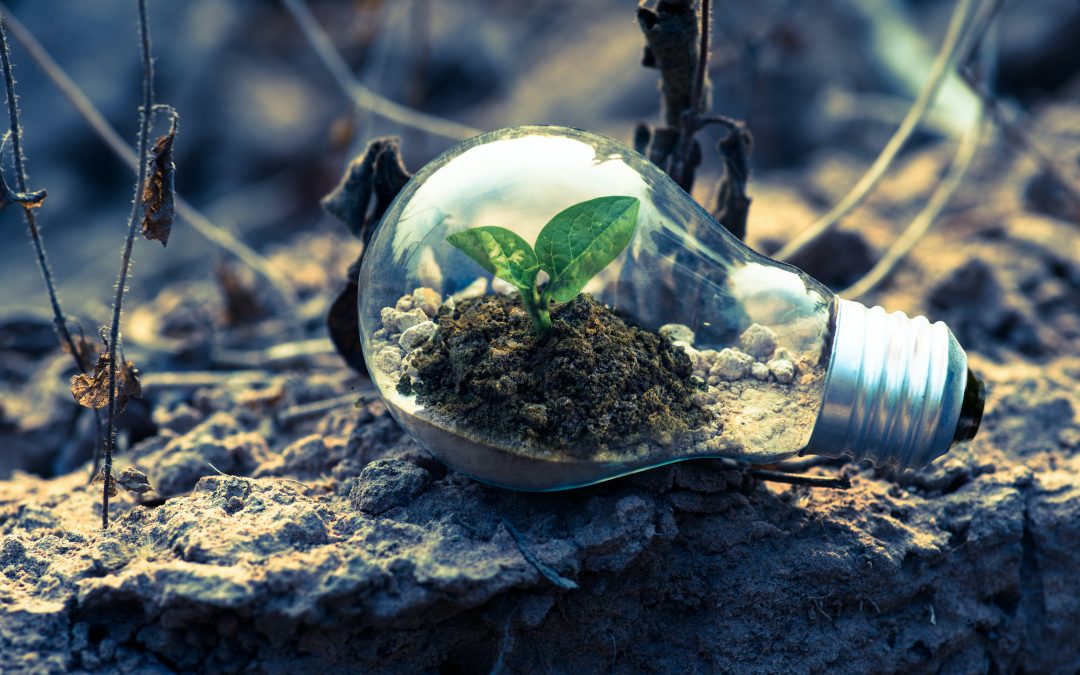

Slovenia is a hotspot of biodiversity
Author: Miha
Slovenia is the absolute champion in Europe in terms of the number of species per square kilometre of territory.
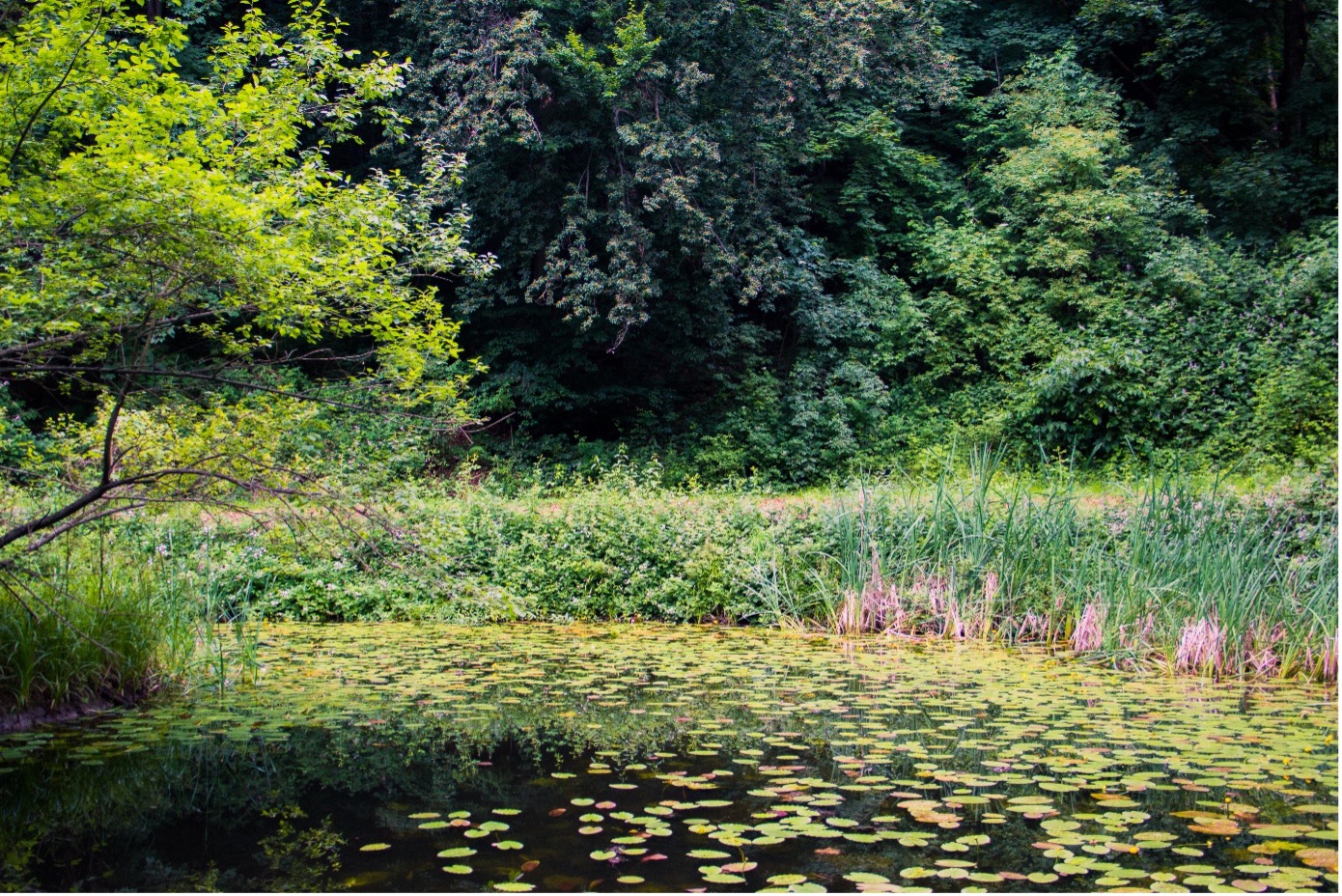
Picture 1: Dragon Lake
Image by Miha Turk
Slovenia is one of the biodiversity hotspots in Europe. Our country lies at the crossroads of the Alpine, Pannonian, Dinaric and Mediterranean biogeographical regions. It is characterized by a varied relief, diverse rock base and varied soil and climatic conditions. The consequence of such diversity factors is the great diversity of ecosystems and plant and animal species.
Absolute European champion
Scientists have so far recorded about 24.000 living species in Slovenia. Among them are 3.200 species of higher plants, 1.200 species algae, 3.000 species of fungi and 15.000 species of animals. More as a quarter of animal species are endemic.
Slovenia is the absolute champion in Europe in terms of the number of species per square kilometre of territory. According to some biodiversity indicators is among the richest even in the world. In European ecosystems are important mainly vast forests covering more than half of the country. Our country is our homeland karst, which is set with the richest cave fauna in the world. Slovenia covers a modest 0.004 percent of the earth’s surface, but at the same time is home to more than 2 percent of known terrestrial animal species.
Regardless of such species richness, they are too declining trends are noticeable in our country biodiversity. There was a big contraction wetlands that have been drained for agriculture over the past decades. The ones left are under lately severe pressure of urbanization. The damage was also suffered by the traditional agricultural landscape, which is increasingly biotical depleted due to the need for the cheapest, monocultural food production using agrochemicals.
Every inhabitant of Slovenia theoretically has one hectare of Slovenian territory available but it uses the ecosystem services of as many as four and a half hectares of land.
Green deal – plan to restore biodiversity
Slovenia also takes big part in the European green Deal which was first presented in December of 2019 and whose primary goal is to build a more sustainable European economy. This includes a new growth strategy that will transform the European Union into a modern, resource-efficient and competitive economy where there will be no net emissions of greenhouse gases by the 2050, where economic growth will be a decoupled from resource use and where no person and place is left behind.
Biodiversity loss and the climate crisis are interdependent. When one gets worse, so does the other. Restoring forests, soils and wetlands and creating green spaces in cities is essential to achieving the climate change mitigation needed by 2030.
The Green Deal provides a plan to restore biodiversity and cut pollution. European Union aims to be climate neutral in 2050 and reaching this target will require action by all sectors of our economy such as investing in environmentally friendly technologies, supporting industry to innovate, decarbonising the energy sector, choosing cheaper and cleaner forms of public transport and ensuring buildings are more energy efficient. The plan also includes making the EU a world leader in addressing the global biodiversity crisis.
Why should we conserve biodiversity?
Nature has a wonderful attribute of self-cleaning, self-renewal and development. However, only as long as our exploitation remains within the limits of sustainable use.
It is very difficult to imagine that in nature it is all connected, interdependent, and that these connections are very complex. Bugs and tiny insects in the soil are small but indispensable components of human life that must maintain balance, power renewal, cleansing, and growth to be human can survive.
Insects need to pollinate our crops; aquatic plants, snails, vortices, crustaceans, and other small organisms must maintain the self-cleaning power of our rivers. For us perhaps insignificant beetles must be food for birds and bats to take care of it, that we do not get unpleasant or harmful insects reproduced too much… Plants must retain the amount of oxygen in the atmosphere at which we have evolved, and which is fit for our life.
The consequences of for example, the disappearance of some butterfly species are not shown immediately. We know the diversity of species and habitats give nature stability, from which we depend on. This stability means that we have the guaranteed goods we are used to – drinking water, a suitable climate, food, and crops. Broken stability of nature for us means the occurrence of unforeseen and unforeseen events.
The world has exceeded the limits of sustainable use in the 80 ‘s years of the 20th century. First because of ignorance and no knowledge of natural laws, and later due to selfishness and indifference to what is common with us. At the beginning of the third millennium, the burden on ecosystems by humanity exceeded the absorption and the regenerative capacity of planet Earth.
Today, despite the complexity of nature and ignorance of all the details, we know enough that no knowledge is no longer an excuse. We just cannot afford indifferency anymore!
Current problem
In these times a big problem for Slovenian biodiversity and nature is also Covid-19 crisis which has mutated from a health issue to a full-blown economic and societal crisis. The whole world is affected, and states in both hemispheres are attempting different measures to try to save their economies. In Slovenia, on 30th April, the government announced a new “anti‑Corona law”, to protect the health of their citizens and “revive the economy – especially the building sector”. But the government also snuck in measures to completely undermine the country’s environmental safeguards.
They excluded environmental NGOs from participating in formal Environmental Impact Assessments. For some large construction projects such as windfarms or powerlines or investments in agricultural intensification, Environmental Impact Assessments are not even required at all. And many of the EIAs that are currently running can simply be cancelled. On top of that, deadlines to file lawsuits at the administrative court – an essential legal tool against environmental crimes – have been cut back from 30 to 15 days.
So, how can we help at the moment?
At the moment, we can help the Institute of the Republic of Slovenia for Nature Protection. When you notice one of the four species of beetles – carob, alpine, oak or beech goat, enter your observations on the web portal www.sporocivrsto.si. You will help them collect data on rare, endangered, Natura 2000 species of beetles.
We can also help the nature and biodiversity by recycling, using bikes and public transport, eating local food, using eco friendly products and so on. There are many more ways to preserve biodiversity, but we all need to consider them. Let me end this article with this quote by Helen Keller: “Alone, we can do so little; together we can do so much.”
Sources:
https://zrsvn-varstvonarave.si/wp-content/uploads/2019/09/Biodiverziteta__Koncna_verzija_2306.pdf
https://www.zurnal24.si/slovenija/25-let-slovenije/slovenija-je-vroca-tocka-273261
https://ec.europa.eu/info/strategy/priorities-2019-2024/european-green-deal_sl
Miha Turk
Three Presidencies for Climate – So Green is the Trio Presidency
Author: Carla
„Think European – Act Local“ is the slogan of a new project on the occasion of the EU Trio Presidency. But to what extent is the Trio Presidency really „for climate“? Živa Zajc and Carla Moritz investigated this question.
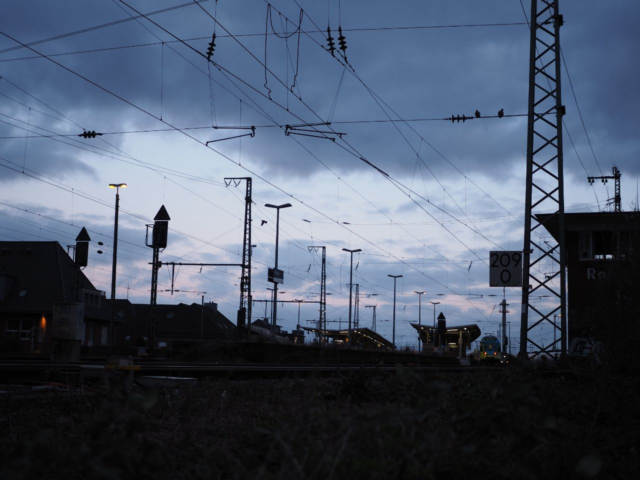
Rail transport and an energy union are to be among the main focuses of the Trio Presidency’s environmental policy. Photo: Linus Walter
In the agenda, Germany, Portugal and Slovenia set common themes and priorities for their EU policies. These three countries will take over the Presidency of the Council of the EU for six months, one after the other. During those 18 months, they will work together as a trio to ensure continuity. According to Portuguese ambassador Francisco Ribeiro de Menezes, the agenda of the Trio Presidency is an „ambitious program“ to combat climate change. Slovenian Ambassador Franc But also emphasizes that „Slovenia, Germany, and Portugal are three environmentally-oriented states.“
As per their Agenda of the Trio Presidency, the Trio Presidency is committed to the Green Deal and intends to work towards „a climate-neutral Europe by 2050“ during its term of office. But how exactly do they intend to make the EU more climate-friendly between 1 July 2020 and 31 December 2021?
In the common plan for the one and a half year presidency, „Building a climate-neutral, green, fair and social Europe“ is stated as one of the five main objectives. More specifically, for the forthcoming EU presidencies, this means working towards a climate-neutral Europe by 2050, and the fulfillment of the Paris Climate Agreement. According to the three governments‘ plan, the transition should be „cost-effective, just, socially balanced, fair, and achieved in a way that preserves the EU’s competitiveness“.
Environmental goals published by the Trio Presidency
Until now, there have been no visible measures or strategies to reach the goals set in the agenda of the Trio Presidency. The actual program presents only a few proposed approaches.
The proposals are:
- Realization of the Energy Union: The Trio Presidency aims to realize a common, European energy market with a focus on sustainable energy. According to the consilium of the EU, one of the advantages of the Energy Union is the high potential for renewable energy sources. Phased excess energy from renewable sources, e.g. during strong wind, can be sold to other EU countries. Renewable energy from offshore wind power stations and hydrogen will be particularly supported, according to Dr. Susanne Hegels of the German Ministry of Economics and Energy.
- Transport: According to a publication of the transport ministries of the three countries, Germany, Slovenia and Portugal want to create „affordable and sustainable mobility“ during their presidency. They want to support the breakthrough of alternative driving systems and fuels. Additionally, the means of transport on rails and in water should be supported. The ministries of infrastructure of the three countries have agreed to „significantly further increase passenger numbers and the amount of freight transported by rail.“
- A „renewed sustainable finance strategy“: According to publications of the european commission, the aim of the strategy is to redirect private capital flows towards green investments and to encourage sustainable business management.
- Sustainable water management: According to the agenda of the Trio Presidency, they aim to support sustainable growth in marine and maritime sectors, and create a comprehensive Oceans Agenda.
- The Green deal: The 8th Environmental Action Programme – also referred to as the Green – deal should be brought to fruition. You can read more details about the goals of the green deal at the end of this article.
- Sustainable and circular agriculture, fisheries and food systems: The ministers of the Trio Presidency will focus on good, safe, and affordable food – to ensure ample supply in times of crisis, and sustain animal welfare. Moreover, they aim to further advance the Common Agricultural Policy (CAP), an EU concerning European farmers and society. Here, they intend to support the legislative proposals of the European Commission, and to change the Common Agricultural Policy in a sustainable way.
- Sustainable forest management: The three countries have agreed on a forest policy that emphasises the many services that forests provide, and which is based on the strengthened EU Forest Strategy post-2020. The European Commission will develop this strategy in the last quarter of 2020 to enlarge, protect, and improve forest areas.
Trio EU Presidency agenda receives criticism
As written above, there are few concrete strategies in the proposed policies. For example, although the transport ministries of the three countries are talking about an intended increase in the number of passengers on trains, no strategy is presented on how to achieve this. The German Federal Ministry of Transport has, to date, not replied to a request for comment.
Because of the unambitious goals and inaccuracies, the EU Trio Presidency faces criticism by environmentalists regarding their sustainability strategy. Former member of the Bundestag Hans-Josef Fell told the Euroactive Media Network that the program of the German EU Presidency has „no concrete statements, but overblown rhetoric that is not accompanied by sufficient measures, but with completely inadequate goals“.
Covid-19 crisis vs. climate crisis
There is, however, another problem which is more important for the three countries at the moment: the Covid-19 crisis. As this crisis brings additional economic challenges, the Trio Presidency intends to „implement all appropriate measures serving a robust recovery of the European economy“, but as stated in their agenda, „in line with a sustainable and inclusive growth strategy“. Therefore, investment in a sustainable economy should be considered in the reconstruction of the European economy.
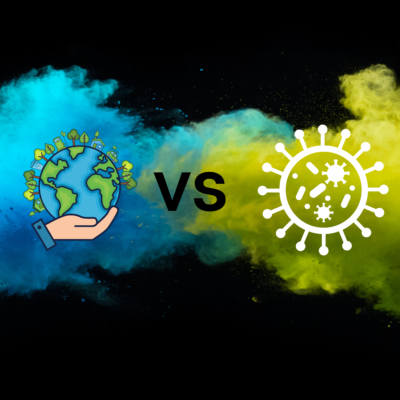
Are worries about the Covid-19 crisis overshadowing efforts to protect the climate? Image: Živa Zajc with Canva
Susanne Hegels from the German Ministry of Economics and Energy emphasises this as well: „Environmental issues have not become less important due to Corona. We see the green deal as an opportunity for the European industry and economic recovery and we should use the chance that we have now to make our economy more future-oriented and environmentally friendly.“
Even if environmental protection is taken into account while combating the consequences of the COVID-19 crisis, the focus of the Trio Presidency does not seem to be on sustainability. Interestingly, the word „climate“ is only used 13 times in the agenda, while „COVID-19“ is used 38 times.
Environment: A Lasting Issue for EU Policy
In contrast to the COVID-19 crisis, the environment is not a new topic for the EU. Europe has been fighting against environmental problems since the early 1970s. After the first UN conference on the environment held in Paris in 1972, an action program was mandated – however, it remains limited by the subsidiarity principle. This means that choices are made as close to citizens as possible, unless EU action is more successful than the measure at a national, regional, or local level. This applied for a requirement of consent in the Council, with regard to fiscal matters, town and country planning, land use, quantitative water resource management, choice of energy sources, and structure of energy supply.
The first legal basis for a common environment policy came with the Single European Act in 1987, which was introduced as new Environment Title. It included the aims of preserving the quality of the environment, protecting human health, and ensuring rational use of natural resources. Until today there have been seven, environmental action programs. In this overview we have summarized the seven programs from 1973 until 2030:
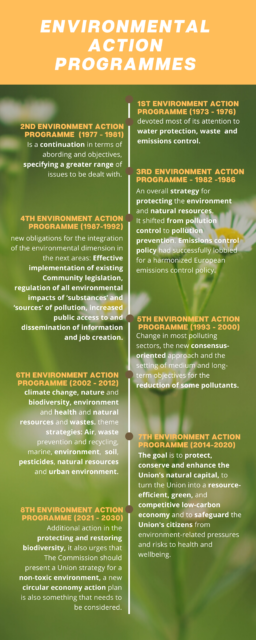
The Green Deal – a guideline for the environmental policy of the Trio Presidency
On December 2019 the European Green Deal was presented the first time. It is the 8th Environmental Action Programme and the consequence of some environmental issues, which have recently risen to new heights. The deal is affecting economies and policies worldwide. Its goals are that there will be no net emissions of greenhouse gases by 2050, that economic growth will be decoupled from resource use, and that no person and no place will be left behind. This deal presents a plan to boost the efficient use of resources by moving to a clean, circular economy, to restore biodiversity and cut pollution.
However, the plans of the EU are not cheap. The EU Budget for Climate and Environment is set for 503 billion euros. According to the official website of the EU, the climate and energy target for 2030 will require additional investments of 260 billion euros a year by 2030. The success of the plan to be climate neutral in 2050 in all sectors of the economy, depends on the actions taken for environmentally friendly technologies, on decarbonizing the energy sector, and on the construction of energy-efficient buildings. The EU will also carry out a series of initiatives that aim to protect the environment and boost the green economy, like the Climate Pact, the program „From Farm to Fork“, the European Climate Law, Circular Economy Action plan, clean energy and many others.
In the end, the Green Deal is like a guideline for the environmental policy of the Trio Presidency. However, it remains open whether the measures presented by the three countries are sufficient to work towards the objectives of the Green Deal. If this is not the case, it will be difficult to describe it as a „green“ Trio Presidency „for climate“.
Živa Zajc and Carla Moritz…are two young media enthusiasts who sometimes annoy their friends with talking about climate protection.
Disclaimer
The supporting organizations for the production of these articles do not constitute an endorsement of the contents, which reflect the views only of the authors, and the supporting organizations cannot be held responsible for any use which may be made of the information contained therein
What happend to »no more plastic«?
Author: Teja Miklavčič
Covid-19 came into our lives with many negative side effects. But another symptom of the pandemic is climate amnesia. Politikorange journalist Teja Miklavčič talks about what a pandemic can’t let us forget – that saving lives only makes sense, if we’re saving the life-giving planet along with them.
Picture: Engin Akyurt / unsplash.com
I have been in Provence, Rome, Hamburg; Munich, Plymouth, Venice; Vienna, London, Salzburg, and Graz. And that’s just a few I can remember off the top of my head.
I saw some cities. I’ve seen some cultures and people. And I’ve seen so much pollution and waste of plastic in stores, at gas pumps, in parks, bars, and restaurants.
Statistics show that here, in Slovenia, every resident creates an average of 1,3 kg communal waste per day. Communal waste is waste that comes from household, production, store, or service activities.
More than 1 million seabirds die every year; one in four fish has plastic in their stomach; there are more than 150 million tons of plastic in the ocean right now and 83% of water has micro plastic in it. We could go on.
It’s fine if we make mistakes
The corona crisis forced us to make some very significant mistakes. We’ve been through some terrible times, and it’s not over yet. A few years ago, the Slovenian president told us that we will abolish small plastic products for good. Indeed, we have seen some great improvement. In Slovenia, plastic cutlery and cups in stores are very hard to find. That made me happy. But we still have tons of plastic.
And then, this pandemic arrived. All of a sudden, plastic gloves were everywhere. Masks for single use were everywhere. And not just on people’s faces, but on the streets and in the ocean. I understand that this situation is unprecedented, and that people reacted to take care of themselves. But we all forgot about the environment. Everything was just about people and health, all over again. We forgot about everything else overnight.
There is no Planet B
We need to save planet earth, because there is no alternative. If we forget about this little Earth, we will all soon be gone and nothing will matter anymore – not our problems, not Covid-19, not if we gain a little bit of weight.
Plastic is a huge intruder in life, so make good decisions. It’s up to you: you can buy a mask for single use or you can buy a unique, well designed, cotton mask, that lasts forever.
Teja Miklavčič…is a proud Slovenian, who doesn’t want to stop learning about life and cultures. She loves to travel and getting to know other people.
Disclaimer
The supporting organizations for the production of these articles do not constitute an endorsement of the contents, which reflect the views only of the authors, and the supporting organizations cannot be held responsible for any use which may be made of the information contained therein

Nedavni komentarji